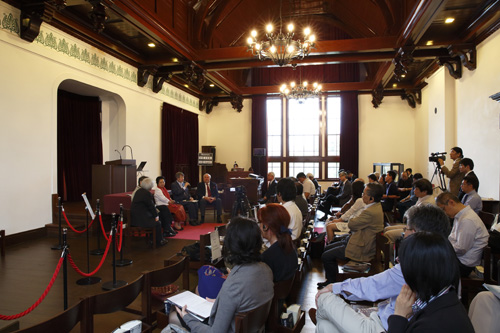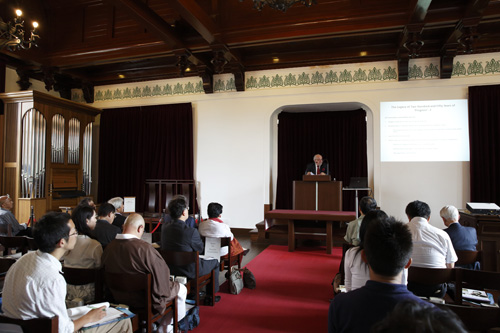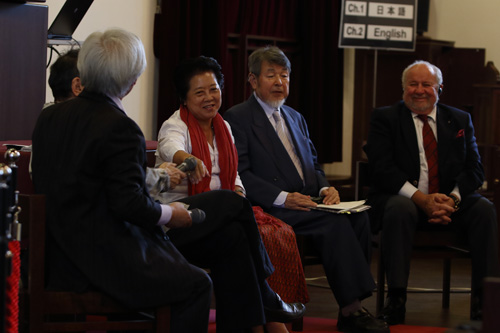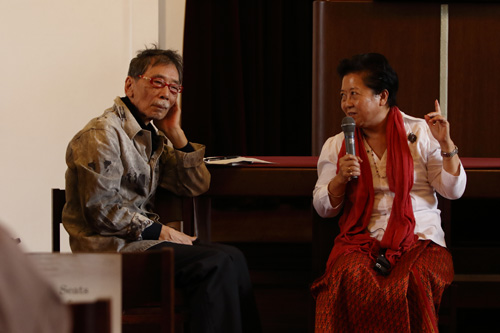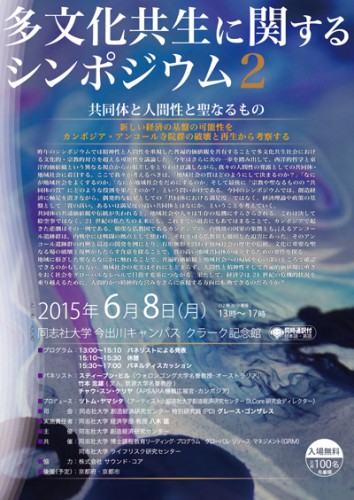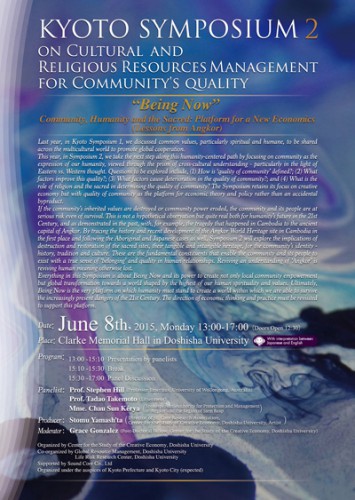- ▶ 2015年06月08日 第6回 St.CORE研究会
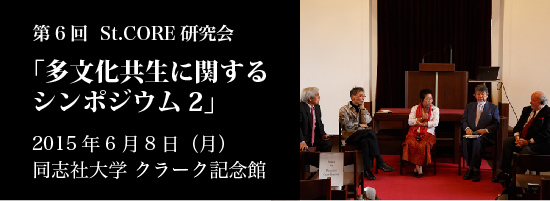
第5回 「多文化共生に関するシンポジウム2
”Being Now” 共同体と人間性と聖なるもの」
日時:2015年6月8日(月)
会場:同志社大学 クラーク記念館
■プログラム
13:00~15:10 パネリストによる発表
15:10~15:30 休憩
16:10~17:00 パネルディスカッション
■パネリスト
スティーブン・ヒル(ウォロンゴング大学名誉教授・オーストラリア)
竹本 忠雄 (文人、筑波大学名誉教授)
チャウ・スン・ケリヤ(APSARA機構広報官・カンボジア)
■司 会
同志社大学 創造経済研究センター 特別研究員(PD)グレース・ゴンザレス
■実施責任者
同志社大学 経済学部 教授 八木 匡
■主 催
同志社大学創造経済研究センター
■共 催
同志社大学博士課程教育リーディング・プログラム グローバル・リソース・マネジメント(GRM)
同志社大学ライフリスク研究センター
■協 力
株式会社 サウンド・コア
■後 援
京都府 京都市
新しい経済の基盤の可能性を カンボジア・アンコール寺院群の破壊と再生から考察する
昨年のシンポジウムでは精神性と人間性を重視した普遍的価値観を共有することで多文化共生社会における文化的・宗教的対立を超える可能性を議論した。今年はさらに次の一歩を踏み出して、西洋的哲学と東洋的価値観という異なる視点からの眼差しをとりわけ意識しながら、我々の人間性の発露としての共同体・地域社会に着目する。ここで我々が考えるべきは、「地域社会の質はどのようにして決まるのか?」「なにが地域社会をよくするのか」「なにが地域社会をだめにするのか」そして最後に「宗教や聖なるものの “共同体の質”にどのような役割を果たすのか?」という問いかけである。今回のシンポジウムでは、創造経済に軸足を置きながら、偶発的な結果としての「共同体における満足度」ではなく、経済理論や政策の基盤として「質の高い、あるいは満足度の高い共同体とはなにか」ということを考えていく。 共同体の共通価値観や伝統が失われると、地域社会や人々は生存の危機にすらさらされる。これは決して絵空事ではなく、21世紀の私たちの未来にも、これまでの過去にもあてはまることで、カンボジアで起きた悲劇はその一例である。敬虔な仏教国であるカンボジアの、内戦後の国家の象徴とも言えるアンコール遺跡群は、内戦中には戦闘の拠点として使われ、それを司る仏教界も徹底した迫害にあった。そのアンコール遺跡群の再興と最近の開発を例にとり、有形無形を問わず地域社会の歴史や伝統、文化に重要な聖なる場の破壊と復興がもたらす含意を探ることで、質の高い地域共同体が成立するための要件を探る。 地域に根ざした聖なるなにかに触れることで、普遍的価値観と地域社会への帰属を心の深いところで確認できるのかもしれない。地域社会の充実はそれにとどまらず、人間性と精神性そして普遍的価値観に重きをおく社会をグローバルなレベルで目指す変革につながる。果たして、経済学は21世紀の危機的状況を乗り越えるために、人間的かつ精神的な営みをさらに重視する方向に転換できるのだろうか?
KYOTO SYMPOSIUM 2 on Cultural and ReligiousResourcesManagement for Community’s quality
“Being Now” Community, Humanity and the Sacred: Platform for a New Economics (Lessons from Angkor)
Last year, in Kyoto Symposium 1, we discussed common values, particularly spiritual and humane, to be shared across the multicultural world to promote global cooperation. This year, in Symposium 2, we take the next step along this humanity-centered path by focusing on community as the expression of our humanity, viewed through the prism of cross-cultural understanding – particularly in the light of Eastern vs. Western thought. Questions to be explored include, (1) How is ‘quality of community’ defined?; (2) What factors improve this quality?; (3) What factors cause deterioration in the quality of community?; and (4) What is the role of religion and the sacred in determining the quality of community? The Symposium retains its focus on creative economy but with quality of community as the platform for economic theory and policy rather than an accidental byproduct. If the community’s inherited values are destroyed or community power eroded, the community and its people are at serious risk even of survival. This is not a hypothetical observation but quite real both for humanity’s future in the 21st Century, and as demonstrated in the past, with, for example, the tragedy that happened in Cambodia to the ancient capital of Angkor. By tracing the history and recent development of the Angkor World Heritage site in Cambodia in the first place and following the Aboriginal and Japanese cases as well, Symposium 2 will explore the implications of destruction and restoration of the sacred sites, their tangible and intangible heritage, for the community’s identity – history, tradition and culture. These are the fundamental constituents that enable the community and its people to exist with a true sense of ‘belonging’ and quality in human relationships. Reviving an understanding of ‘Angkor’ is reviving human meaning otherwise lost. Everything in this Symposium is about Being Now and its power to create not only local community empowerment but global transformation towards a world shaped by the highest of our human spirituality and values. Ultimately, Being Now is the very platform on which humanity must stand to create a world within which we are able to survive the increasingly present dangers of the 21st Century. The direction of economic thinking and practice must be revisited to support this platform.
会場となったクラーク記念館2階クラーク・チャペルでは、スティーブン・ヒル氏(ウォロンゴング大学名誉教授・オーストラリア)、 竹本 忠雄 氏 (文人、筑波大学名誉教授) 、チャウ・スン・ケリヤ氏(APSARA機構広報官・カンボジア)の3氏から発表があった。
その後、本会のプロデューサーである ツトム・ヤマシタ氏(アーティスト、同志社大学創造経済研究センター St.Core研究会ディレクター)、本会の実施責任者である八木 匡 同志社大学経済学部教授が加わり、パネルディスカッションが行われた。
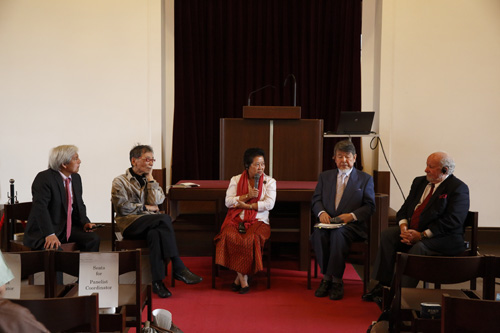 (左から)八木教授、ツトム・ヤマシタ氏、チャウ・スン・ケリヤ氏、竹本 忠雄 氏、スティーブン・ヒル氏
(左から)八木教授、ツトム・ヤマシタ氏、チャウ・スン・ケリヤ氏、竹本 忠雄 氏、スティーブン・ヒル氏
■資料 パンフレット
活動
Activity

